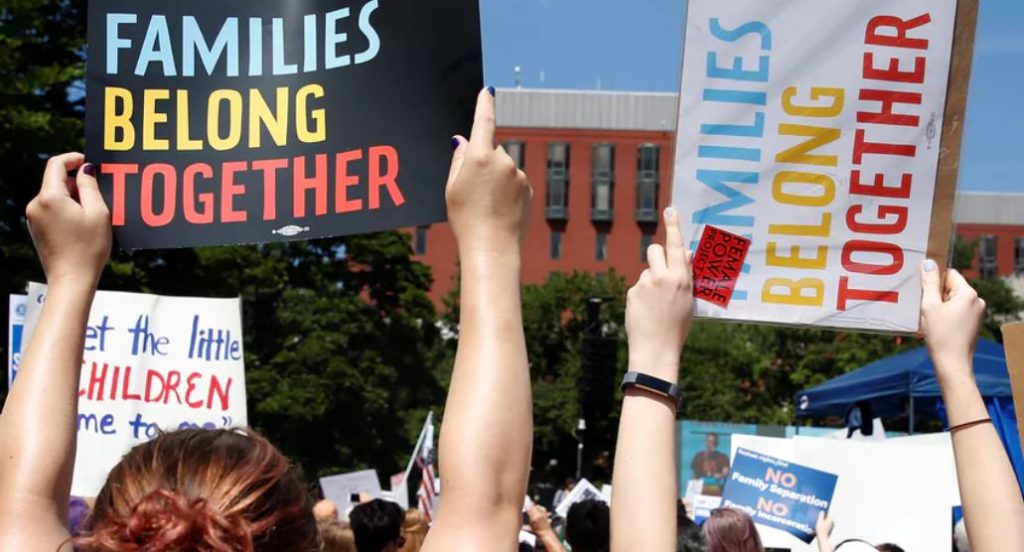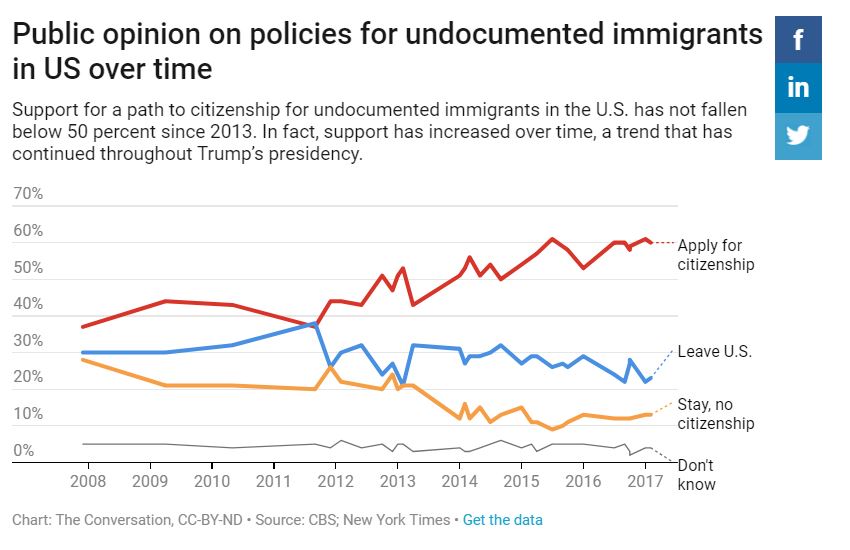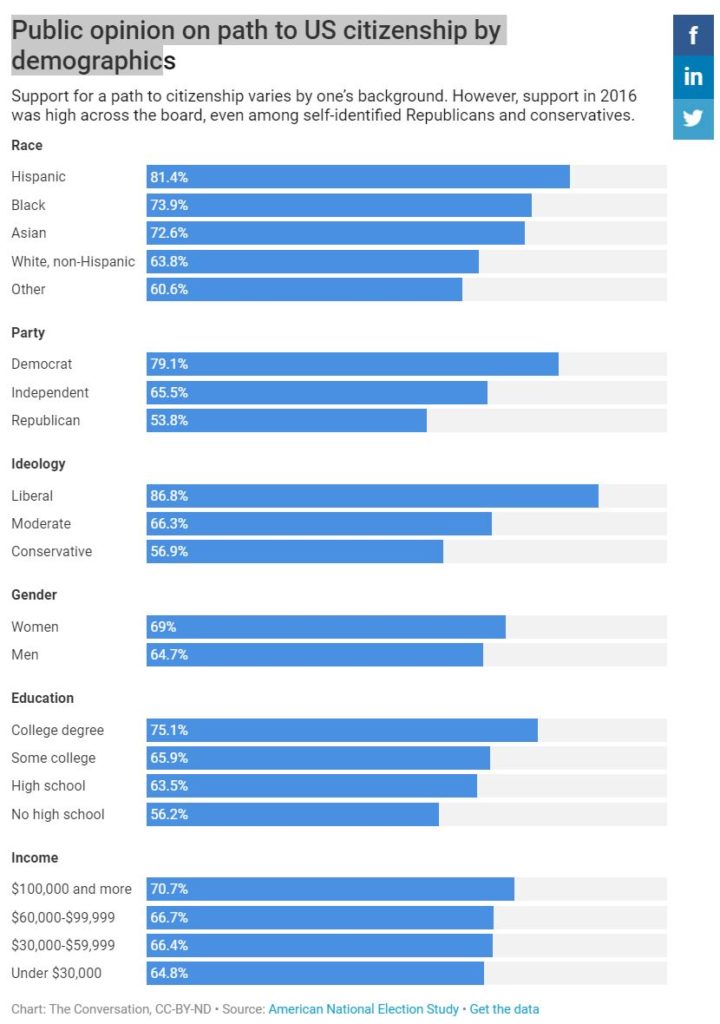Lawmakers in Washington, from the president down to first-term members of Congress, may be misjudging how the public feels about immigration.
President Donald Trump appears to believe the country needs and wants hard-line policies. Members of Congress haven’t stopped him from carrying out those policies.
Do the American people really support them?
It turns out that government officials who think the majority of Americans want hard-line immigration policies are wrong.
Elected officials – both Republican and Democratic – tend to think that their constituents are more conservative than they actually are on immigration and other issues. Moreover, recent research suggests that Republican constituents have been more likely to contact their elected officials than Democratic constituents.
Yet, my research on public opinion about immigration, and that of other social scientists, shows that the American public is supportive of more welcoming immigration policies. Welcoming policies might include a pathway to citizenship for undocumented immigrants, accepting more asylum claims or allowing the use of multiple languages in public places.
Most Americans support a path to citizenship
I am a scholar of public opinion about immigration and national identity, and I have studied how people from a variety of backgrounds feel about immigration-driven diversity in the United States.
Let’s look at public opinion on one immigration proposal that has been debated for over a decade: providing a path to citizenship for undocumented immigrants living in the U.S.
Since late 2007, polls conducted by CBS and The New York Times have asked respondents which option they prefer when it comes to “illegal immigrants working in the United States.” The options include: allow them to stay in their jobs and eventually apply for U.S. citizenship; allow them to stay only as guest workers but not apply for citizenship; or require them to leave their jobs and the country.
This question has been asked in 31 CBS/New York Times surveys since 2007. In 22 of them, providing a path to citizenship is the majority preference. Support for citizenship has not fallen below 50 percent since 2013. In fact, support has increased over time, a trend that has continued throughout Trump’s presidency.
Support for a path to citizenship varies by one’s background when it comes to race, gender, education, income, party and ideology. However, support is high across the board, even among those who say they are Republican or conservative.
Of course, this is only one of many immigration policies getting attention these days, and support for other policies varies.
Attitudes on this policy show that Americans are not as divided or as conservative as the discourse coming out of Washington, D.C. might reflect and is becoming even more supportive of the welcoming approach. Yet, providing a path to citizenship is also the primary policy that seems to keep thwarting legislative reform in Congress.
A welcoming climate need not alienate US-born whites
Public officials may be concerned about alienating non-immigrant whitesif they pursue welcoming immigration policies. We tried to find out whether that alienation could happen. In a recent experiment, my colleagues and I asked U.S.-born whites in Arizona and New Mexico how they felt about their state adopting more welcoming or restrictive immigration policies.
We asked people if the proposed policy would make them angry, sad or happy. We found that liberal and moderate whites responding to the more welcoming treatment were more likely to be happy and less likely to be angry or sad than were those who were responding to the restrictive treatment.
We also asked them if the proposed policy would make them feel more or less at home and more or less likely to want to move. Again, we found that liberal and moderate whites, in response to the welcoming treatment, felt more at home and less likely to want to move than did liberal and moderate whites who were given the unwelcoming treatment.
Only conservative whites were happier, less angry, less sad and felt more at home in response to restrictive treatment. Every one else fared better when told that their state was considering adopting policies that welcomed immigrants.
It is worth noting that in the 2016 data mentioned above, only 35 percent of whites identified as conservative while 65 percent identified as either liberal, moderate or other.
Squeaky wheel gets the grease
Given these data, why is a conservative approach to immigration dominating in Washington?
In American politics, it is the squeaky wheel that gets the grease. Within the Republican Party, which holds a majority of seats in Congress, voters with more conservative preferences on immigration and other issues have been more active in recent years than other party members. As long as that continues to be the case, Republican politicians will feel that they need to push restrictive immigration policies if they wish to remain in office, even if the majority of their constituents feel otherwise.
As more and more people respond to President Trump’s immigration agenda with protests and participation in electoral politics, this asymmetry in engagement may change.
Viewers are encouraged to subscribe and join the conversation for more insightful commentary and to support progressive messages. Together, we can populate the internet with progressive messages that represent the true aspirations of most Americans.



The constant vilifying of immigrants as criminals, rapists and now pushing the MS-13 scare factor by Trump does not tell the true story about immigrants. As far as the MS-13 Gang, it has its roots in Los Angeles in immigrant neighborhoods where they come from broken homes, single parent homes or those where the parents work several low-paying jobs and have little time to spend with their children..
They are mainly in Los Angeles, Washington and Long Island. They have their roots in Los Angeles but had migrated to El Salvador although once in El ‘Salvador they became more organized and brutal due to policies there and prison conditions.
According to Justice Department data, MS-13 has about 10,000 members here which is half the size of the Bloods and one-fifth the size of the 18th Street Gang which is MS-13’s archenemy.
Many immigrants as soon as they get here look to learn English so they are better able to understand most U.S. citizens they need to deal with on a daily basis. They also work hard and take many jobs which do not pay much and that most U.S. citizens would not even think of taking such as slaughter houses, production of food on the mega farms, landscapers & maids.
Many of the wealthy take advantage of immigrants by treating them bad and not paying them minimum wage. Even though many citizens benefit from the work immigrants do, they still vilify them as far as immigration is concerned.
Many of the immigrants are entrepreneurs, beginning their own businesses and hiring people here in the United States. Since they are undocumented and may have false Social Security numbers, they are still paying taxes to the U.S. government and contributing billions of dollars to the treasury helping many others but unable to take advantage of the benefits and other government programs available to American citizens